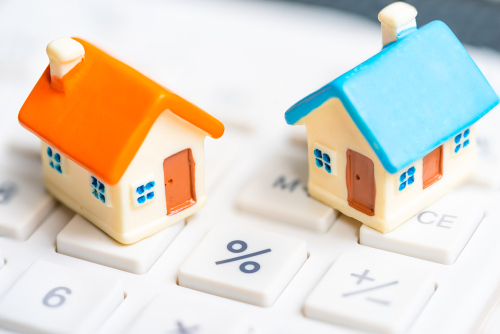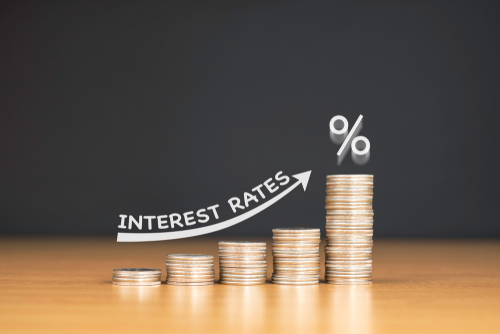
A prominent lettings and sales agency says there are four reasons why house prices won’t fall off a cliff, despite interest rate and inflation worries.
Tom Bill, head of residential research at Knight Frank, warns that there will be a slowdown for the rest of this year, triggered by the fact that inflation - the headline rate of which remains at 8.7 per cent - is now the most worrying economic measure.
But he adds: “That said, the wage growth driving core inflation higher is one of the reasons we don’t expect a steep double-digit fall in house prices this year. Record levels of housing equity, the availability of longer mortgage terms and the popularity of fixed-rate products in recent years should also prevent a collective cliff-edge moment for the housing market.”
Other analysts also resist talking of sharp price falls but are unstinting in their concern about existing and future borrowers. And there is near unanimity that today’s monetary policy committee meeting at the Bank of England will signal another base rate rise.
Jonathan Moyes, head of investment research at Wealth Club, says: “Inflation data will make for grim reading for anyone looking to remortgage later this year … This is a real headache for the Bank of England, there is a sense that the economy is increasingly fragile, financial conditions are tightening, and yet inflation continues to defy expectations. This could put a 0.50 per cent interest rate rise on the table against the 0.25 per cent [previously] expected. Too much tightening however, and the bank risks damage to the economy.”
Emma Prince, financial planner at business consultancy Quilter, comments: “The looming [interest rate] increase will directly hit those on variable and tracker mortgages. While those on fixed-rate deals may find temporary relief, the steadily rising rates foretell a harsh reality once these deals end. This situation is especially concerning for those homeowners whose ultra-low fixed rate deals are due to end, leaving them to navigate the evolving interest rate environment.
“Those looking to the government to step in to help them in this storm will be left wanting as it is unlikely to intervene due to the fear of worsening inflationary pressures. This seemingly 'cruel to be kind' approach may leave homeowners vulnerable but will hopefully help push inflation down in the long run.”
And Mark Harris - chief executive of mortgage broker SPF Private Clients - says the surprise inflation data should trigger a rethink. He says: "At least inflation had been moving in the right direction, even if at a frustratingly slow pace – now with no movement this month, it will put further pressure on the Bank of England to hike interest rates yet again. There is a strong argument for pausing the rate rises for now, giving the market time to settle down and adjust. Consecutive base rate rises have been painful and done little to stem inflation; it’s time for a different approach, letting them take effect, rather than causing continued anxiety and distress for borrowers."
Yesterday the government announced that the headline rate of Inflation in the UK remained at 8.7 per cent in the year to May, the same figure as April. Rising prices for air travel, recreational and cultural goods and services were blamed for the largest individual price rises; food and non-alcoholic beverages costs rose in May as well, but by less than in May 2022.
However, the really bad news was that so-called ‘core’ - a key measure which strips out energy, food, alcohol, and tobacco - rose by 7.1 per cent in the year to May. That is the highest since March 1992. Core figures are typically considered to carry the most weight when the Bank of England looks at the state of the economy.















%20-%20IMAGE%20Client%20Accounting%20%E2%80%93%20what%20are%20your%20options.jpg)

%20(002).png)
.png)
.png)

%20(002).jpg)







Join the conversation
Jump to latest comment and add your reply
I'm all for keeping a stiff upper lip about this, and I appreciate that past performance has no bearing on future performance but I think we all can see whats coming.
I can give you lots of reasons why there will be no crash. High employment, rising incomes, low supply, high demand, high rents. Antedotally we are a nation of homeowners, and making a profit is not the first priority for a great many, the odd wobble in the HPI line that always goes up doesnt concern most buyers in spite of the media negativity.
Likewise, many realise that this rate cycle is a temporary one and whilst it may be a painful few months for some, its not enough to change a cultural catnip for people who want to own their own place. We all know rates will start to come down quickly when this inflation spike is finally dealt with, it is not a fundamental issue driven by the dynamics of our own economy.
Lastly, the housing market is too important in our economy to be allowed to fail, and whenever there is the prospect of a possible more meaningful drop in prices, government steps in and provides assistance to stimulate activity which increases HPI as we saw in the pandemic. Keep calim and carry on even if the Nationwide reports a drop of a couple of % in the next month or 2 and the Daily Mail predicts the end of the world is nigh.
Its wishful thinking that interest rates will be substantially lower in the future, 5% is the long term average and is considered to be normal, the ultra low rates since 2008 are the anomaly and I doubt we will see there like ever again, better get used to it.
Please login to comment